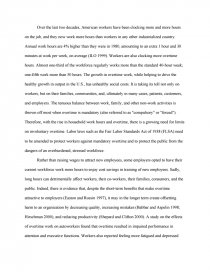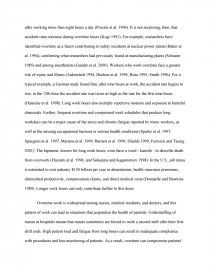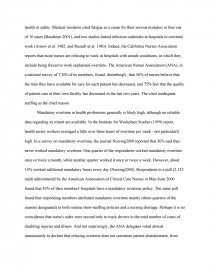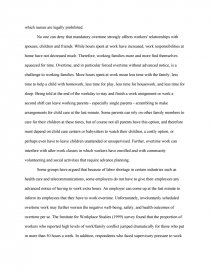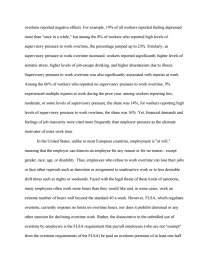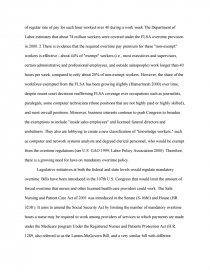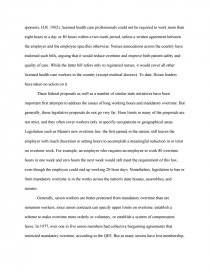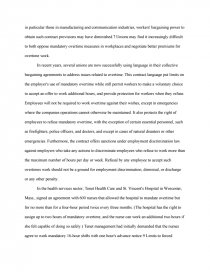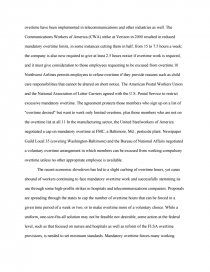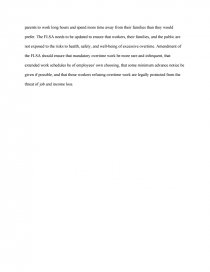Mandatory Overtime
Essay by review • March 21, 2011 • Research Paper • 3,013 Words (13 Pages) • 2,791 Views
Over the last two decades, American workers have been clocking more and more hours on the job, and they now work more hours than workers in any other industrialized country. Annual work hours are 4% higher than they were in 1980, amounting to an extra 1 hour and 30 minutes at work per week, on average (ILO 1999). Workers are also clocking more overtime hours. Almost one-third of the workforce regularly works more than the standard 40-hour week; one-fifth work more than 50 hours. The growth in overtime work, while helping to drive the healthy growth in output in the U.S., has unhealthy social costs. It is taking its toll not only on workers, but on their families, communities, and, ultimately in many cases, patients, customers, and employers. The tenuous balance between work, family, and other non-work activities is thrown off most when overtime is mandatory (also referred to as "compulsory" or "forced"). Therefore, with the rise in household work hours and overtime, there is a growing need for limits on involuntary overtime. Labor laws such as the Fair Labor Standards Act of 1938 (FLSA) need to be amended to protect workers against mandatory overtime and to protect the public from the dangers of an overburdened, stressed workforce.
Rather than raising wages to attract new employees, some employers opted to have their current workforce work more hours to enjoy cost savings in training of new employees. Sadly, long hours can detrimentally affect workers, their co-workers, their families, consumers, and the public. Indeed, there is evidence that, despite the short-term benefits that make overtime attractive to employers (Easton and Rossin 1997), it may in the longer term create offsetting harm to an organization by decreasing quality, increasing mistakes (Babbar and Aspelin 1998; Hirschman 2000), and reducing productivity (Shepard and Clifton 2000). A study on the effects of overtime work on autoworkers found that overtime resulted in impaired performance in attention and executive functions. Workers also reported feeling more fatigued and depressed after working more than eight hours a day (Proctor et al. 1996). It is not surprising, then, that accident rates increase during overtime hours (Kogi 1991). For example, researchers have identified overtime as a factor contributing to safety incidents at nuclear power plants (Baker et al. 1994), confirming what researchers had previously found at manufacturing plants (Schuster 1985) and among anesthetists (Gander et al. 2000). Workers who work overtime face a greater risk of injury and illness (Aakerstedt 1994; Duchon et al. 1994; Rosa 1995; Smith 1996). For a typical example, a German study found that, after nine hours at work, the accident rate begins to rise; in the 12th hour the accident rate was twice as high as the rate for the first nine hours (Hanecke et al. 1998). Long work hours also multiply repetitive motions and exposure to harmful chemicals. Further, frequent overtime and compressed work schedules that produce long workdays can be a major cause of the stress and chronic fatigue reported by many workers, as well as the ensuing occupational burnout or serious health conditions (Sparks et al. 1997; Spurgeon et al. 1997; Martens et al. 1999; Barnett et al. 1999; Shields 1999; Fenwick and Tausig 2001). The Japanese, known for long work hours, even have a word - karoshi - to describe death from overwork (Hayashi et al. 1996; and Sokejima and Kagamimori 1998). In the U.S., job stress is estimated to cost industry $150 billion per year in absenteeism, health insurance premiums, diminished productivity, compensation claims, and direct medical costs (Donatelle and Hawkins 1989). Longer work hours can only contribute further to this drain.
Overtime work is widespread among nurses, medical residents, and doctors, and this pattern of work can lead to situations that jeopardize the health of patients. Understaffing of nurses at hospitals means that nurses sometimes are forced to work a second shift after their first shift ends. High patient load and fatigue from long hours can result in inadequate compliance with procedures and less monitoring of patients. As a result, overtime can compromise patients' health or safety. Medical residents cited fatigue as a cause for their serious mistakes in four out of 10 cases (Boodman 2001), and two studies linked infection outbreaks at hospitals to overtime work (Arnow et al. 1982; and Russell et al. 1983). Indeed, the California Nurses Association reports that more nurses are refusing to work in hospitals with unsafe conditions, in which they include being forced to work unplanned overtime. The American Nurses Association (ANA), in a national survey of 7,300 of its members, found, disturbingly, that 56% of nurses believe that the time they have available for care for each patient has decreased, and 75% feel that the quality of patient care at their own facility has decreased in the last two years. The cited inadequate staffing as the chief reason.
Mandatory overtime in health professions generally is likely high, although no reliable data regarding its extent are available. In the Institute for Workplace Studies (1999) report, health sector workers averaged a little over three hours of overtime per week - not particularly high. In a survey on mandatory overtime, the journal Nursing2000 reported that 36% said they never worked mandatory overtime. One quarter of the respondents worked mandatory overtime once or twice a month, while another quarter worked it once or twice a week. However, about 14% worked additional mandatory hours every day (Nursing2000). Respondents to a poll (2,125 total) administered by the American Association of Critical Care Nurses in May-June 2000 found that 43% of their members' hospitals have a mandatory overtime policy. The same poll found that responding members attributed mandatory overtime mainly (three-quarters of the reasons designated) to both routine short-staffing policies and a nursing shortage. Perhaps it is no coincidence that nurse's aides were second only to truck drivers in the total number of cases of disabling injuries and illness. And not surprisingly, the ANA delegates voted almost unanimously to declare that refusing overtime does not constitute patient abandonment, from which nurses are legally prohibited.
No one can deny that mandatory overtime strongly affects workers' relationships with spouses, children and friends. While hours spent at work have increased, work responsibilities at home have not decreased much. Therefore, working families more and more find themselves squeezed for time. Overtime, and in particular forced overtime without advanced notice, is a challenge to working families. More hours spent at work mean less time with the family, less time to help a child with homework, less time for play, less time for housework, and less time for sleep. Being
...
...
